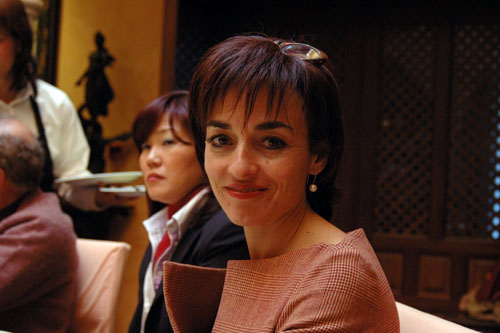Ciudad Real
May 6 - 8, 2025

Mª Teresa de Cuadra
16
feb 2005
The National Wine Fair, FENAVIN 2005, which will be held from 9th to 12th of May in the Ciudad Real Trade Show Center, will reflect on the terminology used in wine tasting during the second day of the show. The talk will be given by María Teresa de Cuadra and Ernesto Suárez, two language graduates who will explain how to say in other languages what we mean about wine tasting.
This talk is based on studies about the language aspects of the terminology used in wine tasting. This is composed of language units from various specialized fields (oenology, botanic, chemistry, agronomy…) but there are other words which belong to the basic vocabulary and which get a whole new meaning when used in this wine tasting context.
"The terminology used is both descriptive and prescriptive and it is important to clarify the context in which the communication is taking place during each occasion", Mª Teresa de Cuadra and Ernesto Suárez clarify almost simultaneously.
Wine tasting terminology, according to both, is not only a subject to be researched, but also and above all, it is subject to applied research, that is, a research carried out for and meant to help the wine sector. Moreover, as they both underline, when talking about wine, an object and subject difficult to grasp in descriptive terms, communication, which should be understandable for everyone and all the groups establishing collusion with it, i.e., professionals and consumers, becomes even more complex.
The sensory analysis in wine tasting, only measuring method acceptable by all, so far, tries to put in objective terms, through language, sensations which have to be inevitably individual through the most subjective means we have, that is, the senses of the analysts.
Mª Teresa de Cuadra is a linguist, specialized in wine terminology and in computer language and Ernesto Suárez is a teacher specialized in literature and painting. As such, they know the difficulties that translating specialized subjects into the ordinary language can entail. In wine tasting, each wine has three dimensions: language, communication and conceptualization, with references, comparisons and the frequent use of metaphors.
Therefore, they recommend to establish first a "level of speech", in which the terms or glossary used would be adapted "according to the audience", that is, the people subject to the communication, "providing a context for those", and using references which can be shared with the others.
Both teachers bring up the example of the labels on the back which are currently in fashion and which do not describe the contents of the bottle where they are affixed but rather talk about vague and contradictory categories, commonplaces which do not make sense and which "do not deserve the consumer's respect".
When analyzing the communication performance on the producers side, using another example and talking about the terminology which is used in the wine tasting notes to be translated into English - language which is now becoming universal, in the wine world as well - they stress the importance of not translating literally the wine description in Spanish but rather to make a search and come up with words which can be understood for the message's target group: the consumers, as usual, in their own reference context.
Despite globalization, they conclude with humor, and to illustrate the reason for their reflections, Mª Teresa de Cuadra and Ernesto Suárez, state it is very unlikely that somebody living in an dry area can fully understand what the concept of "ground vegetation smells" means as a reference. That is why it is "necessary to provide a context" when trying to taste and communicate the qualities of a given wine.
ERP - ENTREPRISE RESOURCES PLANNING
In the same way, during this day, the telecommunications Engineer Jesús Damián García-Consuegra will talk about "why an ERP (Enterprise Resources Planning) and how to choose it?".
This conference is meant to open and contribute to the debate about the need and the help an ERP can supply the companies in the wine sector. To this end, after the introduction explaining what an ERP is, there will be a review of its current capacities. ERP's, like any other software, are continuously being updated, especially due to the technological evolution and also due to the development of more specific solutions for the sector. This evolution has led to a more modular and flexible system.
"This means the installation process is now less expensive and it can include both internal and external processing of the company. As a consequence, it makes easier the operating capacity between suppliers and customers and contributes to the management of policies associated to the supply chain, production planning, etc", explains Jesús Damián García-Consuegra.
Finally, during the talk, there will be a few opinions to help choose the most suitable ERP for the company.
We use our own and third-party cookies to manage the website, obtain information about its use, improve our services or to show you advertising according to your preferences. You can click on ACCEPT, to allow the use of all cookies, or on settings to see the cookies in detail and indicate which ones you want to accept or reject. +info
Settings